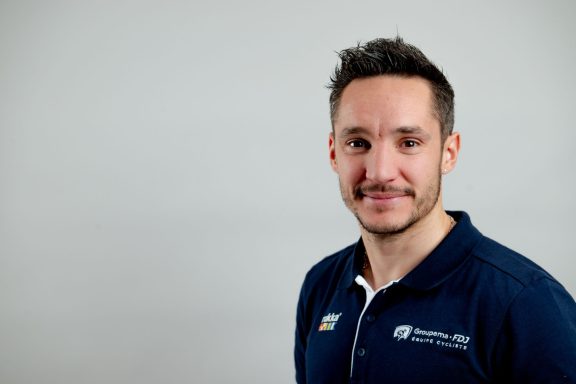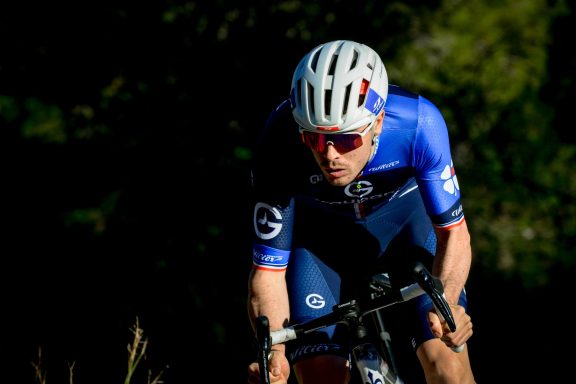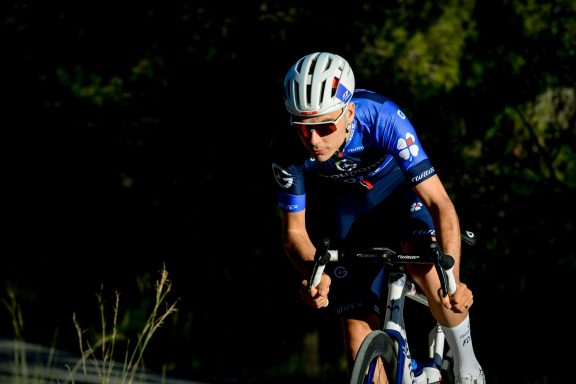Considering the traditional rules of the cycling world, the Rudy Molard’s four-year extension with the Groupama-FDJ cycling team has undoubtedly surprised many. Including himself. However, it is the result of a well-founded and matured reflection from each interested party. In this in-depth interview, Rudy talks about signing this long-term contract, what it means for him, as well as his development and his role within the team.
Rudy, you are now united to the team until 2024. Were you surprised of their four-year offer?
Yes, and to be honest, I have never been that interested in signing long-term contracts. Whether I am at the end of my contract or not, I do my job the same way. It wasn’t something I originally considered, but they came up to me with this offer and I decided to take it because it was not necessarily my intention to leave the team. So I told myself, “Why not four years then?”
“A gesture of trust on both sides”
How did you greet this offer?
I was touched, obviously. In cycling, four-year contracts are rare, almost non-existent. By doing this, they showed me how much confidence they have in me and in my potential. It also strengthened my choice to stay on the team. Those who sign long contracts often do a quiet year or two and then get back to business the last year to renew. By offering me four years, they therefore take a risk in a way, but it mostly shows that they got to know me really well and they know that I give 100% of myself regardless of my contractual situation. It was a big mark of confidence from them.
Do you also see it as a reward for your seriousness and commitment?
I don’t know. Maybe, but we’re talking about professional sports. One doesn’t pay as a reward, one pays for the future. Above all, they have noticed that I’m improving over the years. Each season, I reach new milestones. I see it and I think they do too. So if I keep on progressing, it is also in their interest. I rather see it like that. Of course, signing four years is a very rare thing, especially at my age (30 years), but I firmly believe that my best years are yet to come.
You are also united to the team longer than the team’s leaders themselves…
I don’t know how their negotiations went, but I now feel like a centrepiece of the team as well, in that I negotiate my contract in the same time than the leaders. It’s a great recognition and it probably shows what I bring to the team.
“I love my role in the team”
The team judges you reliable enough to extend your contract for four years. Is this rewarding?
Completely. It shows that the team is aware of my potential and that I totally meet their expectations in the role I have, both as a leader and as a teammate. Now it’s up to me to thank them, to be up to what they offered me, even if it was not an easy choice. I had to think about it. I always need new goals; I need adrenaline on a daily basis. That’s why I was kind of worried with the 4 years in a first place. Having said that, I feel so much serenity in the team, I get along so well with everyone that my choice was to stay anyway. And I think it would have been the same in two years. This is why I accepted four years. Then, it was also by joining the team that I was able to realize my full potential and my real level. Accepting their four-year offer was also a way to thank them for believing in me.
What goal lies behind this long-term contract? Get big results, bring Thibaut as high as possible?
Both! I love my role in the team and that’s also why I didn’t want to leave. I’m given my chance in some races as a leader, and the rest of the time I’m Thibaut’s teammate and we go for wins in the biggest races. To have the pressure to make a result myself but also to be in the top of my game when I am alongside Thibaut, it makes me improve big time. It’s a balance that I wanted to keep and that’s what I was offered.
You wouldn’t see yourself developing in pro cycling other than in this hybrid role?
This is something I care about, absolutely. I don’t want to get into a full-time teammate role. I also want to have personal goals, which give me a boost. I really need that because this is what allows me to be at 100% and find the small details that make me improve. On a four-year contract, this is important, besides Thibaut’s support. The team’s priority is obviously to get a big result on a Grand Tour, but my season is not all about this. And if I want to get to the major events at 100%, I also need to look for one or two personal results beforehand.
“I couldn’t imagine the rest of my career without Thibaut”
Did the option of seeking bigger responsibilities elsewhere come to your mind?
I had opportunities elsewhere. I was offered a role where I would have had more responsibility during the year, but the challenge I was offered here with Thibaut made the difference. I couldn’t see myself riding without Thibaut, or riding for another leader, on a Grand Tour. I love the goal of going for a Grand Tour victory, of achieving something great, and I couldn’t imagine myself doing it without Thibaut. I feel quite close to him and I couldn’t imagine the rest of my career without him. We get along really well, I cherish my role with him and I didn’t want to lose it.
You said earlier that your arrival in the team marked a turning point…
Completely. When I got here, I completely “switched” mentally. I entered into a performance approach. I immediately understood that everything was done to get results here. The goal is to go for the win. I didn’t have that mindset before. In my previous team, they never really highlighted my potential. The management didn’t really believe in me, my profile did not interest them. When I got here, teaming up with Julien Pinot again in training, approaching races in a different way and working for successful leaders really changed everything: my career and my vision of my job. Everything is set up to win races and I love that spirit. The level is also much higher within the team, and when I arrived in the first training camps, I really had to move up a notch. When you get into hills with Thibaut, it’s clearly not the same. It all gave me a boost and also made me look for every detail to raise my level. When I placed eighth in the Flèche Wallonne in my first year, I became aware of my potential. Getting personal results little by little really put me on the right track. Joining the team has been my best career choice, for sure.
Do you think you still have room for improvement?
Certainly. I feel that I have not reached my limit. I don’t know if it’s a chance or not, but when I was young, I never rode my bike in the winter. In my U23 years, I would resume cycling in March. I would spend 4-5 months without touching at my bike. I really fell behind at that time, I didn’t have the same approach to cycling at all, I didn’t know this “planet” where you had to ride also in the winter. For me cycling was in the summer. I had my first serious winter preparation during my neo-pro year. Admittedly I progressed slower, I had a gap to fill, I had to get over few milestones, and I did not always manage to take on the workloads because I did not have this background that all young people now have when they get to the pros. But in the end, this delay I had as a young rider is now useful to me because I have preserved my health and myself. It allows me to improve little by little without skipping stages, and at 30, I feel that I am not yet at my best. Every year, I beat my watt records, whether for short or long measures. It’s a good sign for the future. My career has been shaped this way and it plays in my favour today.
“I’m not trying to be somebody else”
For that matter, you manage to achieve results on your own despite being a teammate for part of the season.
To go from one to another, to do both, seems natural to me. I am passionate about my job, I am there all season, I love all races, and as soon as I am given my chance, I seize it. I am also there whatever the weather, in the cold of Paris-Nice or under the 40°C of La Vuelta. I succeed in being reliable all year round and it’s also a quality that the team appreciates. They know they can count on me anytime. It’s satisfying being able to bring something to Thibaut and bring something me to myself in the meantime. It may be a bit selfish to sometimes go for your chance, but in all modesty, I am happy when the team says to me: “Thibaut won’t be at the Tour of Lombardy, so we are counting on you and David”. It excites me, and in training I tell myself that you should take advantage of it, that people rely on me. I’m looking for this dual role in cycling, that’s what fulfils me. On the one hand, it’s gratifying and it also enables me to observe my true level on the international stage. When you are a teammate and you make efforts at strategic moments, you ultimately do not know what your place would and could have been compared to the best. Here I have the opportunity to compete against the top names from time to time and to know where I stand. The team gives me that chance and it’s also what I love.
How do you appreciate each of your roles?
Both bring me happiness, but it’s completely different. When Thibaut wins atop of the Tourmalet, the emotion is spontaneous; you have tears in your eyes on the bike. It’s magical; these are incredible emotions to experience. When I finished tenth in the Tour of Lombardy, it was more of a personal satisfaction, an afterthought emotion. It’s not a victory, but a top 10 on a Monument is a very good result for me. When I’m a teammate, I have to surpass myself because Thibaut is stronger, and if I want to be with him for as long as possible, to place him at a crucial point, I really have to dig deep. When I’m a leader, I rather try to channel myself, because when you go for a result, you have to race perfectly, not making any mistake and useless effort. It’s a different strategy.
Not overstepping from your functions, is it a quality of yours?
When there is Thibaut at the start, I have no personal thoughts. For me things are clear. There’s no ego at all, I’m absolutely not in competition with Thibaut. Quite the opposite. I’m here to sacrifice myself and help him, and he’s so much stronger that there is no point in feeding an ego. I remain myself, natural, I’m not trying to pretend to be somebody else. I try to give 100% of myself and that is also what the team likes. I am not the future talent in the making. Bringing my best to Thibaut is more than enough for me. What I live by helping Thibaut fills me and I’m not looking for more.
You will be 35 at the end of your contract. It means that you are still motivated to exert yourself for a while.
Sure, I have no doubt about it. Cycling really is my passion, I love my job, I watch all the races on TV. I am aware of how lucky I am to be a pro rider, to have reached this level, to have fun in every race. Making sacrifices is really not a constraint. I love my lifestyle and what I do now. The day I will no longer have this passion, I will stop cycling, but I do not imagine it at all for now. I love what I do so much, I’m so happy and fulfilled to be where I am right now that it’s not about to fly away.



No comment